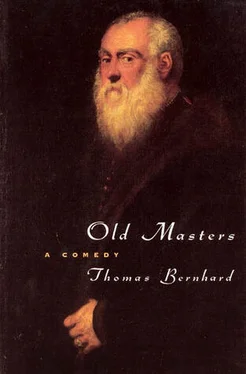un -nature, the school and the state, not my grandparents' home. The state forced me, like everyone else, into itself and made me compliant towards it, the state, and turned me into a state person, regulated and registered and trained and finished and perverted and dejected, like everyone else. When we see people we only see state people, the state
servants , as we quite rightly say, who serve the state all their lives and thus serve un-nature all their lives. When we see people we only see state people as unnatural people succumbed to state dull-wittedness. When we see people we only see people surrendered to the state and serving the state, people who have fallen victim to the state. The people we see are state victims and the humanity we see is nothing other than state fodder with which the ever more gluttonous state is being fed. Humanity is now only state humanity and has lost its identity for centuries, in fact ever since there has been a state, I reflect. Humanity today is only an inhumanity which is the state, I reflect. Man today is only a state man, and in consequence he is today only a destroyed man and a state man as the only humanly possible man, it seems to me. Natural man is no longer even possible, it seems to me. When we see the crowded millions of state people in the big cities we feel sick, because we also feel sick when we see the state. Every morning, as we wake up, we feel sick at this state of ours, and when we step out into the street we feel sick at the state people who populate this state. Humanity is a gigantic state which, if we are honest, makes us sick each time we wake up. Like everybody, I live in a state which makes me sick when I wake up. The teachers we have teach the state to young people, teaching them all the dreadfulness and horrors of the state, all the mendacity of the state, but they do not teach them that the state
is all this dreadfulness and these horrors and this mendacity. For centuries the teachers have taken their pupils into the state's pincers, torturing them for years and for decades and crushing them. And here these teachers walk through the museum with their pupils, on the instruction of the state, and by their dull-wittedness ruin their taste for art. But what else is this art hanging on these walls but
state art, it seems to me. Reger talks only of
state art when he talks about art,
and when he talks about the so-called old masters he always only talks about the state old masters. Because the art hanging on these walls is nothing but state art, at least that hanging here in the picture gallery of the Kunsthistorisches Museum. All the paintings hanging on these walls are nothing but paintings by state artists.
Pleasing Catholic state art, nothing else. Always only a visage, as Reger says, never a face. Always only lineaments, never features. All in all always only the aspect without the reverse, always only lies and mendacity without reality or truth. All these painters were nothing but utterly mendacious state artists pampering to the vanity of their clients, not even Rembrandt is an exception, Reger says. Just look at Velazquez, nothing but state art, or Lotto, or Giotto, always only state art, just as that dreadful proto-Nazi and pre-Nazi Dürer, who put nature on his canvas and killed it,
this horrible Dürer, as Reger very often says because he really hates Durer from the depth of his soul,
this Nuremberg engraver. State-commissioned art is what Reger calls the paintings hanging on these walls,
including even the White-Bearded Man. The so-called old masters only ever served the state or the Church, which comes to the same thing, as Reger says time and again, they served an emperor or a Pope, a duke or an archbishop. Just as so-called free man is a utopia, so the so-called free artist has always been a utopia, Reger often says. Artists, the so-called great artists, I believe, are moreover, says Reger, the most unscrupulous of all people, they are a lot more unscrupulous even than politicians. Artists are the worst liars, even worse than the politicians, which means that the art artists are even worse liars than the state artists, I can hear Reger say again. This art invariably turns towards the allpowerful and the powerful, and away from the world, Reger often says, therein lies its baseness. This art is pitiful, no less, I can now hear Reger saying yesterday, while watching him from the Sebastiano Room today. Why do painters paint at all, when there is such a thing as nature? Reger asked himself yesterday, not for the first time. Even the most extraordinary work of art is only a pitiful, totally senseless and pointless effort to imitate nature, indeed to ape it, he said. What is Rembrandt's painted face of his mother compared with the actual face of mine? he asked again. What are the Danube meadows through which I can
walk while I can
see them compared to the
painted ones? he said.
Recording, people say,
documenting, but, as we know, it is only the mendacious, the untrue, only falsehoods and lies that are recorded and documented, posterity has only falsehoods and lies hanging on its walls, there are only falsehoods and lies in the books which the so-called great writers have left us, only falsehoods and lies in the paintings which hang on these walls. The man hanging on the wall here is never the one the painter painted, Reger said yesterday. The man hanging on the wall is not the one who lived, he said. Of course, he said, you will say that it is
the view of the artist who painted the picture, that is true, even though it is a mendacious view, it is, at least as far as the paintings in this museum are concerned, always only
the Catholic state view of the artist in question, because nothing that hangs here is anything other than Catholic state art and in consequence, as I am bound to say, a base art, it can be as magnificent as it likes, it is only base Catholic state art. The so-called old masters, especially if one regards several of them alongside each other, I mean if one regards their works alongside each other, are all enthusiasts for lies, who have curried favour with Catholic state taste and sold themselves to it, Reger said. To that extent we are dealing only with a thoroughly depressing Catholic history of art, with a thoroughly depressing Catholic history of painting, which invariably found and had its subject in heaven or in hell but never on earth, he said. The painters did not paint what they ought to have painted but only what they were commissioned to paint or what earned them and brought them money or fame, he said. The painters, all these old masters, who most of the time nauseate me more than anything else and of whom I have always had a horror, he said, always only served one master and never themselves and hence humanity. They always painted a fake world, faked by them from within themselves, which they hoped would bring them money and fame; they all of them painted only in this manner, out of greed for money and out of greed for fame, not because they wanted to be painters but because they wanted fame or money, or both fame and money. In Europe they have only ever painted into the hands of a Catholic God or to his face, he said, a Catholic God and his Catholic gods. Every brush-stroke, however inspired, by these so-called old masters is a lie, he said. World decorators is what he yesterday called those he truly and profoundly hated and by whom, at the same time, he had always, throughout his miserable life, been fascinated. Religiously mendacious assistant decorators of the European Catholic rulers, that is what these old masters are, nothing else, you can see that in every dab of colour which these artists shamelessly pressed on their canvases, my dear Atzbacher, he said. Of course you are bound to say that this is the art of painting at its peak, he said yesterday, but do not forget to mention, or at least to think, at least to think for yourself, that it is also an infamous art of painting, the infamous about this art is at the same time the religious, that is what is so repulsive about it. If you post yourself, as I did the day before yesterday, in front of the Mantegna for an hour, you suddenly feel like tearing this Mantegna off the wall, because quite suddenly you perceive it as a great painted infamy. Or if you spent some time standing in front of the Biliverti or in front of the Campagnola. These people, after all, only painted in order to survive and for money and in order to end up in heaven and not in hell, which all their lives they feared above everything else, even though they were very clever but at the same time also very weak characters. The painters altogether did not have a good character, in fact they always had a very bad character and therefore, basically, also always had very bad taste, Reger said yesterday, you will not find a single so-called great painter, or let us say a so-called old master, who had a good character
Читать дальше












